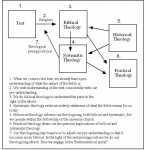Foundations:
You listed many things which are the RESULT, or OUTWORKING, of a person's Biblical understanding... his theological understanding.
Naturally, your Biblical understanding cannot "work itself out" into your life, if the Biblical understanding, the "theology", does not first exist.
It isn't possible to tell someone what God wants, or expects, or thinks, if you haven't even learned basic theology... you must first study the nature and character of God, and the nature and character of man, and what God has done to reconcile us, and how, and why. You need basic doctrine... theology. You cannot counsel someone on a book you don't understand, or do moral philosophizing on a book you don't understand, or engage in personal application of a book you don't understand. Theology comes first because it simply MUST.
Paul talks about studying the scripture, and learning good doctrine, and why these things are so important.
Paul explains why study and theology are so important as a foundation... but I think it's just common sense.
We need to HAVE a foundation before we can BUILD on it.
We can't build on a foundation that doesn't exist.
..
...
Yes Maxwel, thanks for the explanation. Biblical theology is a must.
The root problem for us (when thinking about this) was that we recognize the need for a conceptual framework to fit each piece into the proper slot so to speak.
One such framework is Christian worldview. Some authors have identified the basic elements of it as:
Story (which touches on what you mention: origin, meaning, purpose, condition, need for salvation, atonement, faith, destiny, etc)
Attitude: which some authors think is key, as we are first and foremost to be christian stewards (including our love for God which should be first)
and
Ethics: do unto others what you would like others to do onto you. So yes, no negligent counseling, if not trained to do it is included.
There is a workflow to deal with all of these, and in the article:
What is the discipline of Biblical theology, Graeme Goldsworthy shows a informative diagram:

Like you mention in theory there is a beginning (exegesis, Biblical theology), to then advance to other areas.
What I have noted after interacting with believers in different forums, is that excellent original language and exegetes usually treat the Bible way too much in a synchronic manner, and thus come to wrong conclusions because they do not take into consideration the "whole counsel of God". I believe in diachronical study, and intertextual too.
My interest in Systematics is precisely because it takes the whole counsel of God, and based on it all, tries to come up with adequate theological constructs.
I see a lot of people give lip service to the Bible, but that is all they do, they in reality are just "parakeet believers" pushing some dogma learned from some tradition or denomination, and conveniently violating the basic criteria for validation of theological constructs:

As this thread was a general one just to point a bit towards what kind of subjects I am attracted, I did not give a lot of details.
Now that I have clarified things a bit, I hope you understand that all the subject are influenced by our presuppositions, assumptions, previous understandings, traditions, etc.
So we need a great amount of understanding of Prolegomena, before we can really sit to evaluate doctrine, theological constructs, and the like.
Most protestants want to say that the Bible should be the first authority in these matters, but most of the times the partícula group's interpretation is what is pushed as authoritative.
And that is what Jesus was not in accordance with: note that He told seekers to tell Him what they understood of Sacred Scriptures, never did He ask: "what does the Pharisees doctrine teach?", nor "what does Gamaliel considers the right interpretation of the Scriptures?", no, He asked "how do you read it?, what do you understand?.
I believe that each believer has an undelegable responsibility to evaluate doctrine, theological constructs, suggested or indoctrinated, because we are supposed to check to see if things are so in the light of Scripture. Any less is lack of due diligence.
Kind regards.
6
1







